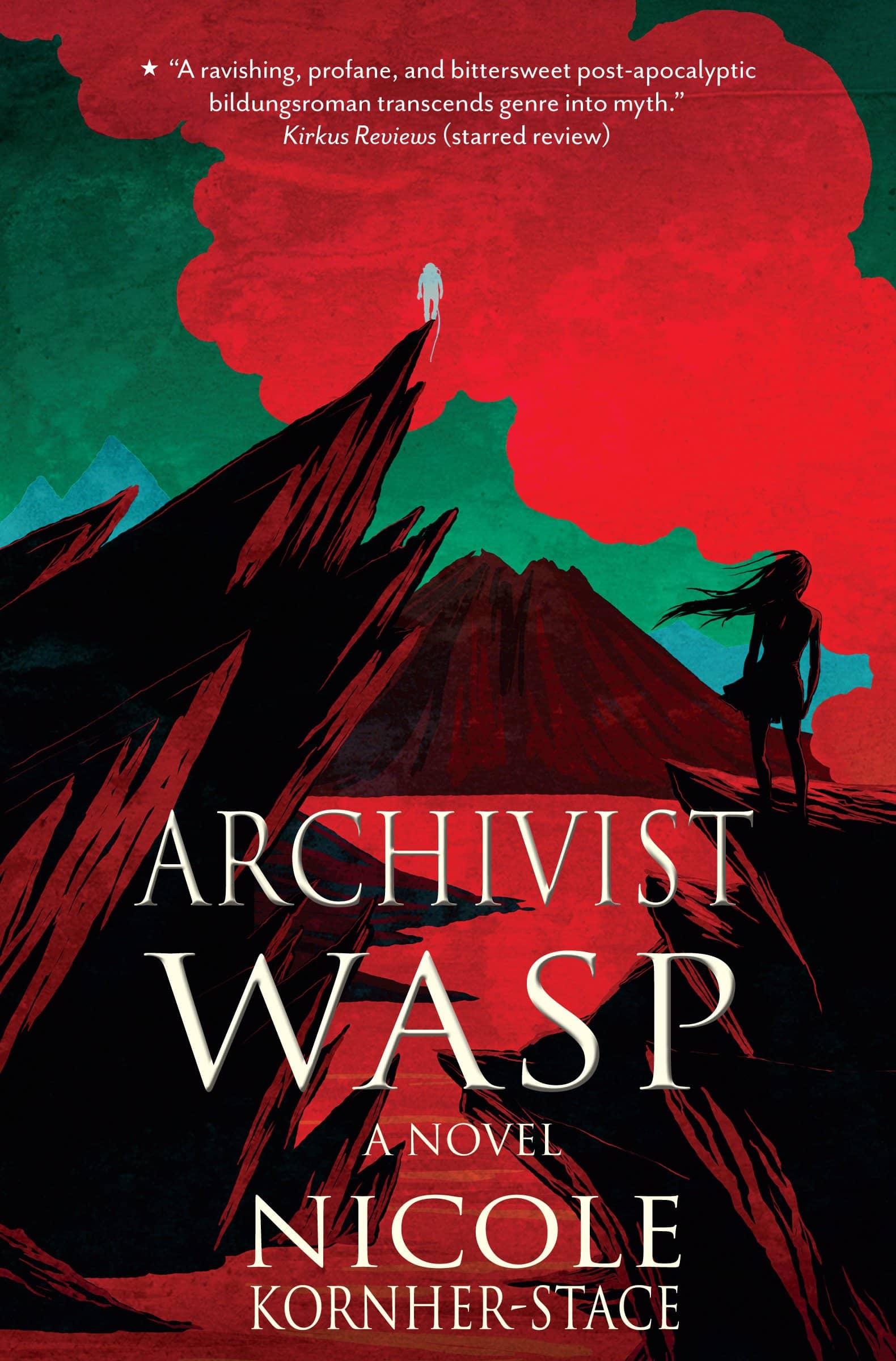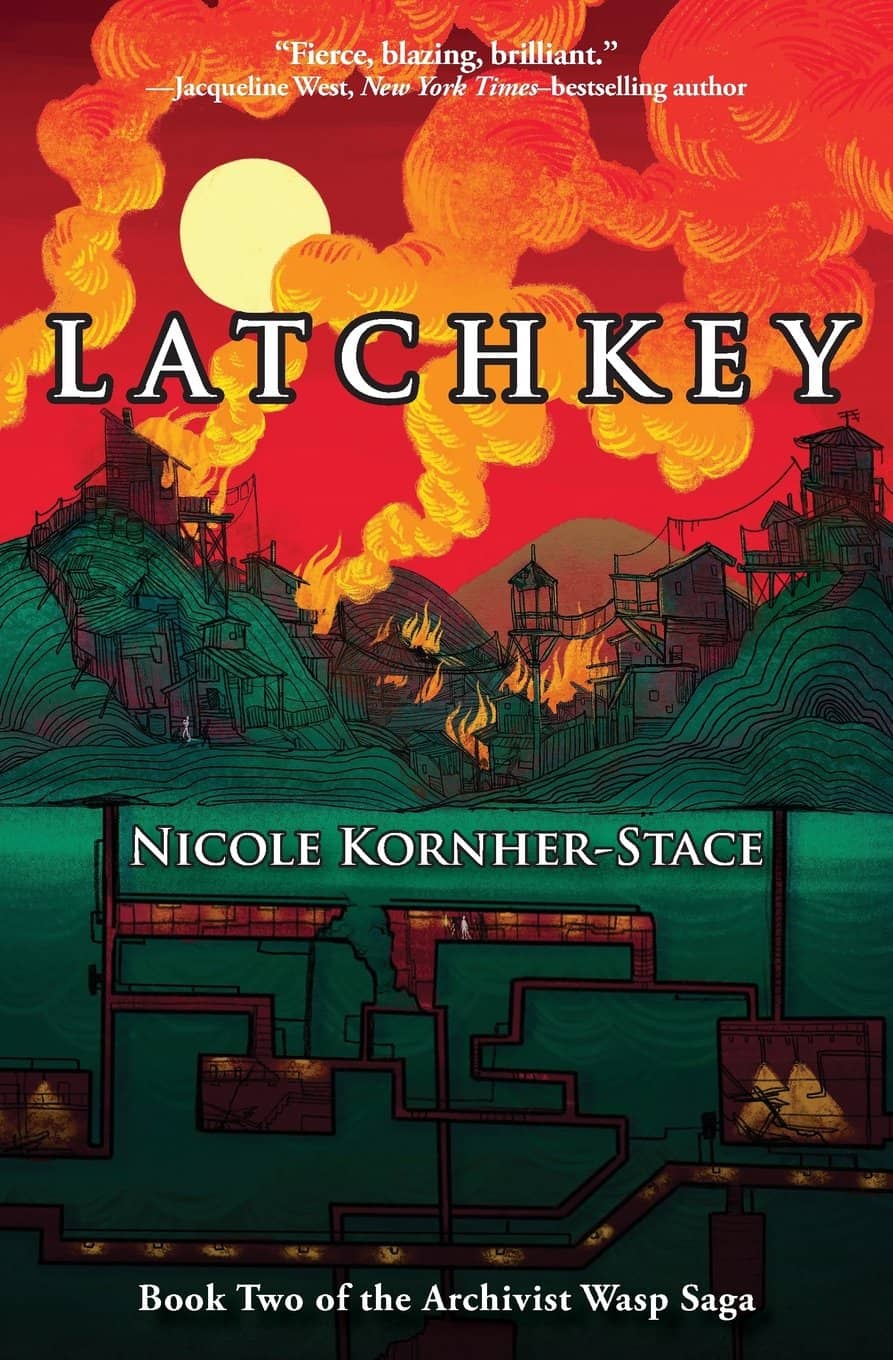Latchkey by Nicole Kornher-Stace Review
A genre-bending post-apocalyptic quest tells a prickly, powerful story about negotiating with ghosts both literal and metaphorical.
Latchkey by Nicole Kornher-Stace is one of our selections for Best New Science Fiction Books in July. It is the second book in the Archivist Wasp Saga.
Everyone knows some feeling of loss, of old friends or places inaccessible and different, changed in the intervening years. Latchkey by Nicole Kornher-Stace, the follow up to 2015’s highly-praised YA crossover Archivist Wasp, blends loss—of one’s childhood, of an entire society, of friends—with a genre-defying post-apocalyptic world with raw clarity and bloody poise. With strong, insightful characterization and a keen sense for tension, it’s a nigh-unstoppable candidate for one of my favorite books this year.
Archivist Wasp followed a teenage ghost-hunter into the world of the dead on her mission help the ghost of a super-soldier find a lost comrade. Latchkey takes place three years later. Isabel, the ghost-hunter formerly known as Wasp, needs to delve into the ruins under her own village to keep people safe from cannibalistic raiders. Once there, she realizes that the history of the ghost she saved is buried in the same tunnels.

The mix of genre is one of the most remarkable things about this series. Post-apocalyptic cults and raiders meeting a world of superheroes feels natural and exciting in Kornher-Stace’s ruthless prose. She creates cinematic scenes with a texture rarely found in science fiction. Her world also focuses on a very large cast of women, including friendships between girls and girls learning to defend themselves specifically because they had been preyed on by a man. There’s no cattiness here, just the rough efficiency of hikers or sailors.
Latchkey is a masterful example of sustained tension within story. As soon as one threat is resolved or one question answered, more are carefully apportioned out in their places. With most of her story spent in the labyrinth of the former laboratory, Isabel is faced with dangers from rock-fall and starvation to ghosts more powerful than any she has seen before. Fight scenes play out wonderfully, like a video game world given all the chance and messiness of the real one. This world’s ghosts are frightening and deeply detailed — weak ones “deliquesce” or float on the surface of water like plastic bags, while strong ones bleed silver energy and move too fast to see. The taxonomy of ghosts, so important to Isabel, is quickly and clearly explained to the reader during vivid fight scenes.
All of it is held together by the three central characters: Isabel, the unnamed ghost she rescued, and former super-soldier Catherine Foster. Isabel is suffering PTSD symptoms she doesn’t recognize, but forges onward, using ritual and breathing exercises to control her own racing thoughts. Characters with various levels of anxiety are becoming more common in fiction — Trail of Lightning has this as well, and it’s wonderful to see that realism here. Isabel in particular is nervous, self-sabotaging at times, but also utterly determined and good-heartened, forging forward to make things right. Her faith in her religion’s gods (which are themselves so prickly they might as well be made of barbed wire instead of stars), her restrained reactions, and her intelligence make her stand out.
So, too, does her relationship with the unnamed ghost she saved. Both are deeply good people with an inability to reach back when someone reaches out to support them. Their conversations left me frustrated by their inability to be honest with one another, but also understanding. Of course two people this damaged, who have staked so much of their hearts on completing nearly impossible missions, would be more comfortable with sibling-like barbs than with emotional honesty.
The landscape itself is memorable, as well, with Isabel and the ghosts walking through the halls where young children trained and surgically altered to become superheroes once lived. The fury the operatives feel for this place is palpable, as is their dependency on it — they never had any other childhoods. The story of what happened in there is played out not only through reenacted memories, but also through evidence found in the setting itself, “showing without telling” of the highest order.

Some aspects of Isabel’s work are stated more directly in Latchkey than in Wasp — ghostgrass, briefly mentioned in the first novel, becomes a major tool here. The descriptions never become repetitive or encyclopedic, though. Fantasy elements are treated with stable realism, although some more description of people and objects would have been appreciated.
Latchkey builds on Archivist Wasp by making explicit some of the thematic connections between Isabel’s upbringing and the ghost’s, all the better for those revelations happening during moments of high tension. The themes of the previous novel are deepened and enriched. The Before-world itself is a ghost presence, stuck in the moment of its collapse, and Isabel and her friends have to negotiate the fact of its death along with the literal phantoms.
The ending, while it did have a dramatic choke-hold on my heart, was not as cinematic or climactic as the lead-up might lead one to expect, and that neat stack of tensions that ran throughout most of the novel loosens up toward the end. I’d also have liked Isabel to spend more time one-on-one with Foster, who at times becomes an avatar for the abusive super-soldier program instead of being given her own chance to talk. The past at times feels more like a superhero story than our world, which can take away from the otherwise cuttingly good themes of anger and loss.
Overall, the book is a haunted, beautiful landscape of humanity and the dead, a windswept field with no shelter from the weather, except when comfort is felt more as an absence of pain. “What was it called when what you were homesick for wasn’t a place?,” Isabel wonders. “Whatever it was, for the first time in years it was gone.”
Latchkey by Nicole Kornher-Stace will be available to buy on July 10th via Mythic Delirium Books, Amazon, or your local independent bookstore.
